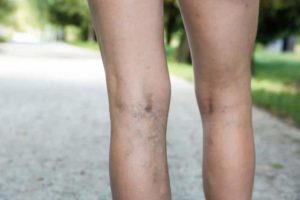
Myth: Exercise more to prevent spider veins.
Fact: While research has demonstrated the clear value of exercise for the prevention of varicose veins, no studies have confirmed that exercise can be as effective on spider veins. Maintaining an active lifestyle affects varicose veins by keeping weight down, encouraging healthy muscle tone in the legs, and by increasing circulation. Spider veins are not related to these factors.
Myth: Sunscreen use will prevent spider veins.
Fact: There is a degree of truth to this statement. Because UV radiation, or sunlight, has been identified as a risk factor for spider veins, there is certainly no harm in covering exposed areas with a broad-spectrum sunscreen. However, there is no guarantee that being sun-savvy will prevent spider veins due to the fact that genetics and hormones are also implicated as risks.
Myth: A healthy diet can prevent spider veins.
Fact: Because spider veins are primarily a result of hormonal or genetic factors, a healthy diet is not indicted as a proven way to prevent them.
Myth: Sitting or standing habits will cause or prevent spider veins.
Fact: People who sit or stand for long period are, in fact, at an increased risk for venous diseases such as blood clots and varicose veins. Likewise, sitting cross-legged can also inhibit adequate blood flow and thus increase the risk for varicose veins. Spider veins are different. They not only develop on the lower extremities, but also on other areas of the body, indicating the involvement of numerous factors.
Myth: You will get spider veins if you wear high heels or tight clothing.
Fact: According to research, sensible shoes are far more preferable than high heels. This is because the positioning of the foot and ankle in high heels has an adverse effect on the leg muscles, which increases the risk for venous diseases. Tight clothing around the legs, ankles, and hips may also inhibit circulation and increase the risk of varicose veins. While there may be a minor correlation between these factors and spider veins, there has been no indication in research that the alternative choices of loose clothing and low-heeled shoes can prevent this condition.
Are spider veins a problem for you? We can help. Call LA Vein Center at (818) 325-0400.

